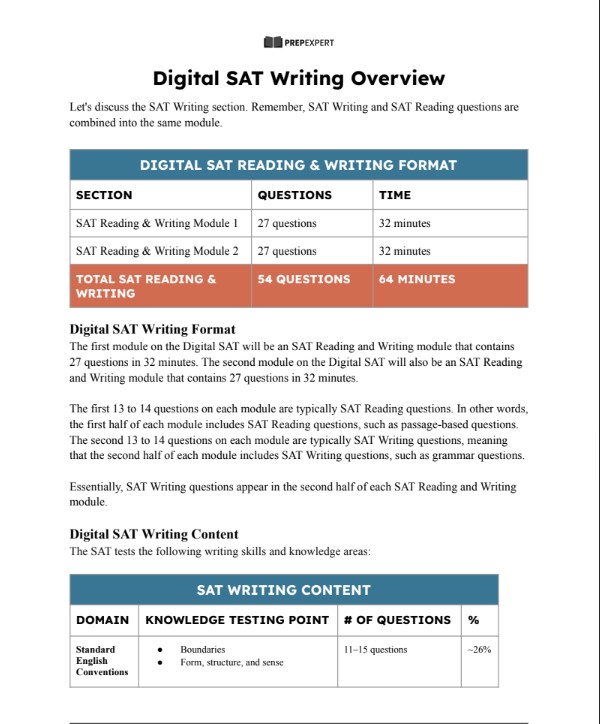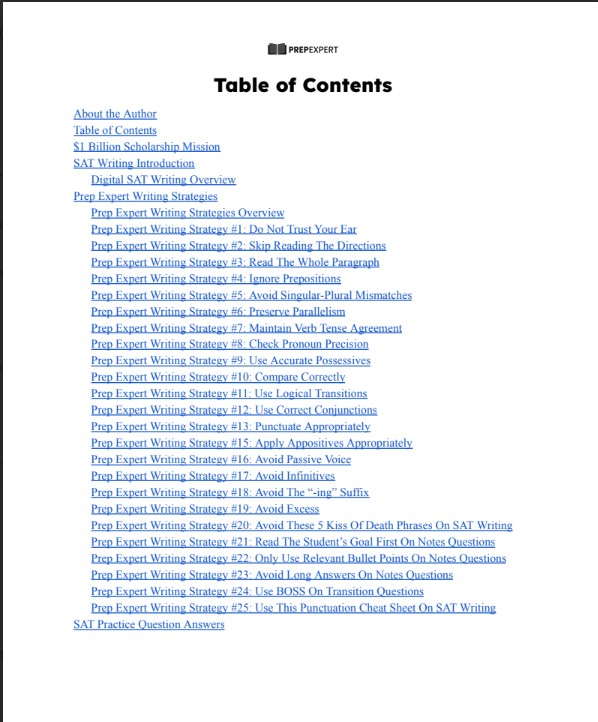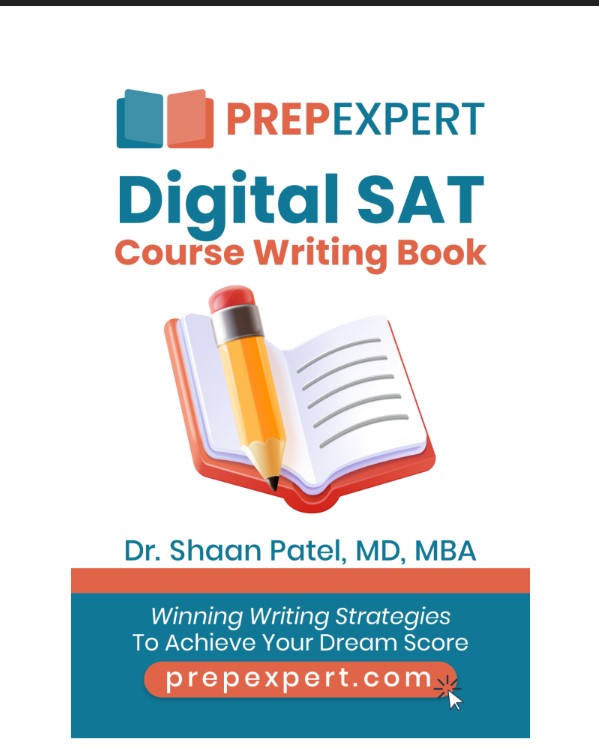


Bild 1: Table of Contents
Table of Contents
About the Author
Table of Contents
$1 Billion Scholarship Mission
SAT Writing Introduction
Digital SAT Writing Overview
Prep Expert Writing Strategies
Prep Expert Writing Strategies Overview
Prep Expert Writing Strategy #1: Do Not Trust Your Ear
Prep Expert Writing Strategy #2: Skip Reading The Directions
Prep Expert Writing Strategy #3: Read The Whole Paragraph
Prep Expert Writing Strategy #4: Ignore Prepositions
Prep Expert Writing Strategy #5: Avoid Singular-Plural Mismatches
Prep Expert Writing Strategy #6: Preserve Parallelism
Prep Expert Writing Strategy #7: Maintain Verb Tense Agreement
Prep Expert Writing Strategy #8: Check Pronoun Precision
Prep Expert Writing Strategy #9: Use Accurate Possessives
Prep Expert Writing Strategy #10: Compare Correctly
Prep Expert Writing Strategy #11: Use Logical Transitions
Prep Expert Writing Strategy #12: Use Correct Conjunctions
Prep Expert Writing Strategy #13: Punctuate Appropriately
Prep Expert Writing Strategy #14: Apply Appositives Appropriately
Prep Expert Writing Strategy #15: Avoid Passive Voice
Prep Expert Writing Strategy #16: Avoid Passive Voice
Prep Expert Writing Strategy #17: Avoid Infinitives
Prep Expert Writing Strategy #18: Avoid The “-ing” Suffix
Prep Expert Writing Strategy #19: Avoid Excess
Prep Expert Writing Strategy #20: Avoid These 5 Kiss Of Death Phrases On SAT Writing
Prep Expert Writing Strategy #21: Read The Student’s Goal First On Notes Questions
Prep Expert Writing Strategy #22: Only Use Relevant Bullet Points On Notes Questions
Prep Expert Writing Strategy #23: Avoid Long Answers On Notes Questions
Prep Expert Writing Strategy #24: Use BOSS On Transition Questions
Prep Expert Writing Strategy #25: Use This Punctuation Cheat Sheet On SAT Writing
SAT Practice Question Answers
Bild 2: Digital SAT Writing Overview
Digital SAT Writing Overview
Let’s discuss the SAT Writing section. Remember, SAT Writing and SAT Reading questions are combined into the same module.
DIGITAL SAT READING & WRITING FORMAT
| SECTION | QUESTIONS | TIME |
| SAT Reading & Writing Module 1 | 27 questions | 32 minutes |
| SAT Reading & Writing Module 2 | 27 questions | 32 minutes |
| TOTAL SAT READING & WRITING | 54 QUESTIONS | 64 MINUTES |
Digital SAT Writing Format
The first module on the Digital SAT will be an SAT Reading and Writing module that contains 27 questions in 32 minutes. The second module on the Digital SAT will also be an SAT Reading and Writing module that contains 27 questions in 32 minutes.
The first 13 to 14 questions on each module are typically SAT Reading questions. In other words, the first half of each module includes SAT Reading questions, such as passage-based questions. The second 13 to 14 questions on each module are typically SAT Writing questions, meaning that the second half of each module includes SAT Reading questions, such as grammar questions.
Essentially, SAT Writing questions appear in the second half of each SAT Reading and Writing module.
Digital SAT Writing Content
The SAT tests the following writing skills and knowledge areas:
SAT WRITING CONTENT
| DOMAIN | KNOWLEDGE TESTING POINT | # OF QUESTIONS | % |
| Standard English Conventions | • Boundaries<br> • Form, structure, and sense | 11-15 questions | ~26% |
| Expression of Ideas | • Rhetorical synthesis<br> • Transitions | 8-12 questions | ~20% |
The first domain is Standard English Conventions, which includes 11 to 15 questions on the SAT. This makes up about 26% of all questions on the SAT Reading and Writing modules. The knowledge testing points within this domain include Boundaries as well as Form, Structure, and Sense. Questions measure a student’s ability to use punctuation properly. Form, Structure, and Sense questions measure a student’s ability to use standard English grammar properly.
The second domain is Expression of Ideas, which includes 8 to 12 questions on the SAT. This makes up about 20% of all questions on the SAT Reading and Writing modules. The knowledge testing points within this domain include Rhetorical Synthesis and Transitions. Rhetorical Synthesis questions measure a student’s ability to selectively extract information from bullet point notes to achieve a writing goal. Transitions questions measure a student’s ability to use logical transitions properly.
Right now, it is not super important to understand all of the above knowledge testing points. We will discuss them more in detail as we cover Prep Expert Writing Strategies. For now, know that these knowledge testing points test grammar. Essentially, the second half of the SAT Reading and Writing modules is going to contain grammar-based questions.
We will teach you Prep Expert Writing Strategies to ace these questions. In summary, 46% of the questions on an SAT Reading and Writing module will relate to Writing. The other 54% of the questions relate to Reading.
Why Separate Writing and Reading?
Reading and writing questions are combined together into the same modules on the SAT. Why does Prep Expert separate out SAT Reading versus SAT Writing? Because the strategies you need to succeed on SAT Writing are different from the strategies you need to succeed on SAT Reading. SAT Reading primarily contains passage-based questions, while SAT Writing primarily contains grammar-based questions. These are two separate skill sets, so we separate out the Prep Expert Strategies for SAT Reading and SAT Writing.
Bild 3: Prep Expert Writing Strategies Overview
Prep Expert Writing Strategies Overview
Prep Expert Writing Strategies are a collection of techniques designed to improve your SAT Writing score. These strategies will help you refine grammar skills, ensure clarity, use effective transitions, and maintain concise writing. Through these strategies, you will learn how to ace complex prompts and eliminate common errors.
Within the SAT Reading & Writing modules, the second half of questions focuses on grammar and writing skills. Prep Expert Writing Strategies help you tackle these last 13-14 questions that test writing mechanics and coherence. These strategies will teach you how to apply appropriate standard English conventions. These skills are not only vital for the SAT, but also for clear and effective writing in academic and professional contexts.
Prep Expert Writing Strategies are adaptable, which makes them an ideal resource for students at all levels of proficiency. Whether you are struggling with grammar basics or looking to polish your writing expertise, these strategies will address your goals.
The foundation of Prep Expert’s approach to SAT Writing is practice. Applying these strategies to actual SAT questions will help you develop habits to express ideas succinctly.
These writing skills will also set you up for academic and professional success. If you aspire to write with clarity and coherence, mastering these strategies is a key step on your journey.
Personally, learning how to write well was the most important skill that I learned in high school. My ability to write clearly has produced tremendous positive results in high school, college, graduate school, business, and beyond. The ability to write well will help you succeed in any future career you choose. Why? Because you will be able to communicate your ideas with clarity, accuracy, and precision.
Prep Expert Writing Strategies pave the path to SAT Writing excellence. By integrating these strategies into your preparation, you can elevate your writing skills. They are a roadmap to success on SAT Writing.
Master and apply all of the Prep Expert Writing Strategies to maximize your SAT Writing score.
Bild 4: PREP EXPERT STRATEGY
PREP EXPERT STRATEGY
Most students approach SAT Writing questions by selecting the answer choice that sounds correct. Do not make this mistake. Do Not Trust Your Ear on SAT Writing questions.
If you trust your ear to select an answer, you will get many SAT Writing questions wrong. Why? Incorrect answers often sound good. Correct answers often sound bad.
Instead, select answers based on known grammatical rules. Learn the grammatical rules that are tested on the Digital SAT. Then, figure out which grammatical rule applies to each SAT Writing question.
Learn the Prep Expert Writing Strategies that we cover in this book. This will help you identify which grammar category each question falls into. It is important that you understand all the nuances of the grammar strategies and rules. Once you have learned these, you will no longer need to rely on your ear for SAT Writing questions. Instead, you will be able to categorize each question by grammatical error.
Here are a few examples of grammar concepts tested on SAT:
- Idioms: You need to identify when there is an idiomatic error.
- Singular-plural mismatches: You need to identify when there is a singular-plural error.
- Parallelism: You need to identify when there is a parallel structure error.
- Verb tense: You need to identify when there is a verb tense error.
Select answer choices based on the category of grammatical error the question is testing, rather than what sounds good to you. The only way to be well-prepared for all the grammatical rules that can be tested on the Digital SAT is to learn all the Prep Expert Writing Strategies covered in this book.
Do Not Trust Your Ear to maximize your SAT Writing score.


